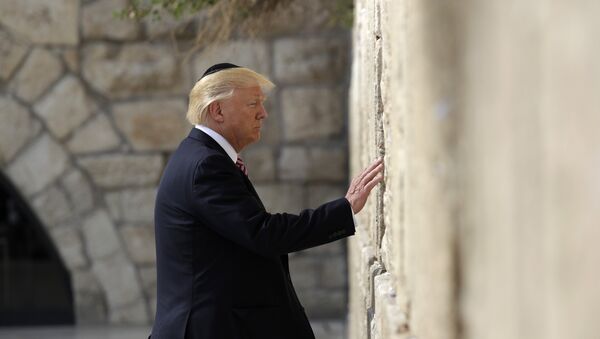Sputnik: Since 1948 more Jews have voted for Democrat candidates than Republicans despite the fact that during this 70-year period both parties have gone through transformation. Would you call the Jewish voting bloc one of the most stable in US politics?
Steven Windmueller: Voting patterns among groups within the United States actually do not generally radically change! In fact, Jewish support for the Democratic Party dates back to the 1930s and probably even earlier, depending on the specific campaigns. The degree of Jewish support for the Democratic Party, however, has varied, meaning that Jewish voters have on specific occasions, as with other voting groups, reflected different interests and choices. For example, President Ronald Reagan received nearly 40% of the Jewish vote in 1980. Part of this shift was a reaction on the part of Jewish voters to the failed policies of President Jimmy Carter (1976-1980).
READ MORE: Supporting 'Israel's Innovative Economy' is 'Goal of Blue & White'- Candidate
Some Republican candidates drew larger Jewish support, including George H.W. Bush, and on other occasions, the Republican Party did less well among Jewish voters, i.e. Donald Trump.
As with others, Jewish voting patterns are quite consistent.
Sputnik: During his first three years as president, Donald Trump established special relations with Benjamin Netanyahu. During this time, the US moved its embassy to Jerusalem and recognised the Golan Heights as part of Israel. How significantly have these steps affected Jewish voters in US?
Steven Windmueller: For those Jewish voters and for some Evangelical Christians who view US-Israel relations as a central issue in determining their political support, Donald Trump has delivered for them!
Jews vote in extremely high numbers; we believe that 85% of eligible Jewish voters participate! That represents the highest involvement by any ethnic or religious community in this nation.
Finally, Jews are active in the political process, including being major funders of candidates and causes of interest to them.
READ MORE: Netanyahu vs. Gantz Election Reveals ‘Just How Far Right' Israel Has Gone
Sputnik: How do you explain such different ideological attitudes among Jews in Israel (where the younger generation is more conservative than the older generation) and in the US where Jewish groups are well-known for their liberal values?
Steven Windmueller: As with all voters, American Jewish voters reflect their specific historic, cultural roots. American Jews have been influenced by three core factors: their American social experience, their Jewish religious and cultural heritage, and specific generational influencers.
Contrastingly, Israeli political behaviour is shaped by other factors distinctive to their history and experience, thereby accounting for the clear differences in orientation and in political behaviour! Jews outside of the United States tend to be more conservative. Even in this country, first generation Russian Jews now living in the United States, as an example, tend to be more conservative than other American Jewish voters. The Americanisation process itself seems to impact over time how the children and grandchildren of immigrants redefine their parents and grandparents’ perception of America.
Sputnik: How effective and connected are big Jewish pressure and lobbying groups such as AIPAC or RJC?
RJC has a particular focus, namely to educate and engage Jewish voters on behalf of the Republican Party and to keep Republican leaders informed about the interests and priorities of the Jewish community. The mission of the RJC includes:
We seek to foster and enhance ties between the American Jewish community and Republican decision makers. We work to sensitise Republican leadership in government and the party to the concerns and issues of the Jewish community, while articulating and advocating Republican ideas and policies within the Jewish community.
READ MORE: Bombing of Aleppo: Analyst on How Israel Raises Stakes After Trump's Golan Move
Both of these organisations are important and demonstrate how very involved and active Jewish Americans are with the political process.
The Jewish community has multiple institutional voices, reflecting the diversity of Jewish interests and approaches. Just as RJC reflects the Republican Jewish voice, the Jewish Democratic Council of America speaks to the interests of Jewish Democrats. J Street offers a countervailing perspective on Israel, as it differs with AIPAC over policy issues surrounding the US-Israel relationship.
The same pattern, namely the presence of competing institutions, exists in connection with other specific political issues involving the Jewish community.
Sputnik: Last year we witnessed several anti-Semitic scandals which involved politicians from the Democratic Party. Have these scandals affected support for the Dems among Jewish voters?
Steven Windmueller: The question itself is somewhat problematic. The major anti-Semitism in this country in recent years came from the alt-Right. The violence directed against Jews as seen in Pittsburgh in October of 2018 and the threats present in Charlottesville in August 2017 were not generated from the Democratic Party. These threats and the violence directed against Jews is very alarming.
American Jews are concerned about all forms of anti-Israel and anti-Semitic expressions and actions. Many Jews see the rise in political hate messaging in this country, whether directed against Jews, Muslims or others, as very problematic to the welfare of our society.
The larger issues here involve efforts to destabilise American pluralism, the institutions of democracy, and trust in leaders which can lead to the undermining of the core values of this society. Some of these threats are indeed internal, yet others are being directed from outside of this nation. In all cases, the overall welfare of a thriving and healthy democracy is critical Jewish and American interests.
The views and opinions expressed in this article are solely those of the speaker and do not necessarily reflect Sputnik's position.





